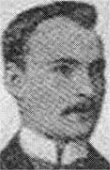 | |||
| Personal information | |||
|---|---|---|---|
| Date of birth | 1874 | ||
| Place of birth | West Hartlepool, England | ||
| Position | Winger | ||
| Senior career* | |||
| Years | Team | Apps | (Gls) |
| 1897–1900 | Thames Ironworks | 32 [a] | (8) |
| * Club domestic league appearances and goals | |||
Henry Hird (born 1874) was an English association footballer who played as a winger. [1]